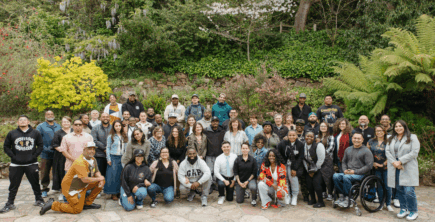
LGBT

Executive Director Chelsea Andrews of EveryOne Home is leading the charge with her talented team in the fight to end homelessness in Alameda County. The organization’s approach is unique and complex— bringing together a myriad of nonprofit providers, the county and cities, and individuals with lived experience to center the voices of those directly affected by homelessness. Its recently completed report, Centering Racial Equity in Homeless System Design, is a critical tool to help us end homelessness in Alameda County, the Bay Area, and across the country.
As EveryOne Home’s advisor at Tides Center, I am inspired by Chelsea’s energy, vision, and partnership acumen, and I’m excited to learn more about her leadership.

“Collaboration is the only way we will gain the momentum to significantly address homelessness.”
How did you come to work in the housing sector? Was there a turning point or specific moment that led you to this work?
When I started as a leader later in my career in affordable housing, it was a full-circle moment. My parents instilled in me an appreciation of the adage, “to whom much is given, much is required,” choosing careers where they gave themselves to serving and advancing our community, especially with affordable housing and serving underserved populations.
My mom was a property manager for a public housing authority for over 30 years, dedicating countless hours towards supporting the residents, and I spent a great deal of my after-school hours next to her at work— affordable housing was center stage in my upbringing. My father, Congressman Alcee Hastings, a political figure and civil rights activist, recently passed away. He served in Congress for over 20 years, and he showed me the power of influence, advocacy, and overcoming trials and tribulations to make positive change in our community and the world.
I think about the love and inspiration that my parents instilled in me which encouraged me to be a servant leader.
I witnessed my parents’ ability to provide for me as well as the many community members who put time and energy in my development and growth, all in an effort to guide my path forward. I grew up in an all-Black community where people seldomly went to college and obtained post-secondary degrees. Receiving an MBA and going to law school was an anomaly. My parents expected excellence despite my circumstances, so I continued to excel. Becoming the general counsel and senior executive vice president at DC Housing Authority and now the executive director of EveryOne Home, I’ve come full circle due to a strong support system and inspirational people in my life.
When people think of the adage, “to whom much is given, much is required,” they often think of money. I think about the love and inspiration that my parents instilled in me which encouraged me to be a servant leader.
What would you say are critical concerns in housing today, and how does your organization aim to address them?
Racial disparities are a key feature of homelessness throughout the United States. In Alameda County, California, where EveryOne Home is located, Black and Native Americans are homeless at the startling rate of four times greater than in the general population.
In acknowledging that structural racism is a root cause of homelessness, EveryOne Home is centering racial equity in every aspect of how we address and end homelessness in our community. We are extremely proud of our recent efforts to restructure our governance, modify our policy decisions, and amplify the decision-making power of people with lived expertise of homelessness.
Only those who have lived it knows what it’s like; the rest of us are biased. For example, from those with lived experience, we learned that it’s better to provide the services that someone wants, rather than being forced on them through wrap-around services. We hope that inviting leaders to the table with lived experience will lead to improved understanding about what works best in our systems for communities.

“We learned that it’s better to provide the services that someone wants, rather than being forced on them through wrap-around services.” (Chelsea Andrews)
What is your approach in leading this work with your staff, communities, and partner stakeholders?
I strongly believe in our collective impact initiative model, which brings together multiple stakeholders to solve our homelessness crisis, but it requires a lot of intentionality to get everyone in alignment. Alameda is a huge county with vastly different terrains and issues throughout. To address homelessness holistically in our county, all of the stakeholders must come together and agree on policies, funding, and the strategies we need to adopt to make a significant impact in ending and preventing homelessness.
Working together as a county means tracking together, looking at the same data, and agreeing on what it’s telling us, so we’re making informed decisions. It means having one-to-one conversations and asking, “Can I get you to commit to come to this next meeting? Do you agree to center racial equity? Who else needs to be here? Where do we have opportunities?” It means hearing from folks who’ve been frustrated or who feel they don’t have a seat at the table.
Collaboration is the only way we will gain the momentum to significantly address homelessness.
What are your organization’s priorities in the next few months?
Currently, we do not have a lot of philanthropic or corporate sponsor engagement. I’m focused on changing the narrative and bringing in more funders to be a part of the conversation. Silicon Valley is bursting at the seams, San Francisco has community foundations, and LA can attract big funders because it’s LA. What about Alameda county? Our homeless numbers are egregious, and we are in serious need of financial support to bring everyone home.
As a result of the Centering Racial Equity report, within the next six months, we will be implementing our new governance charter and recruiting more diverse representation and individuals with lived expertise to reflect the community we serve. We are also creating additional avenues for all of our stakeholders—small cities, nonprofits, youth, elected officials, individuals with lived experience, etc.—to have a voice in our collective efforts to end and prevent homelessness.

LGBT

Corporate Partners

Philanthropy

Read the stories and hear the voices of social change leaders fighting for justice.